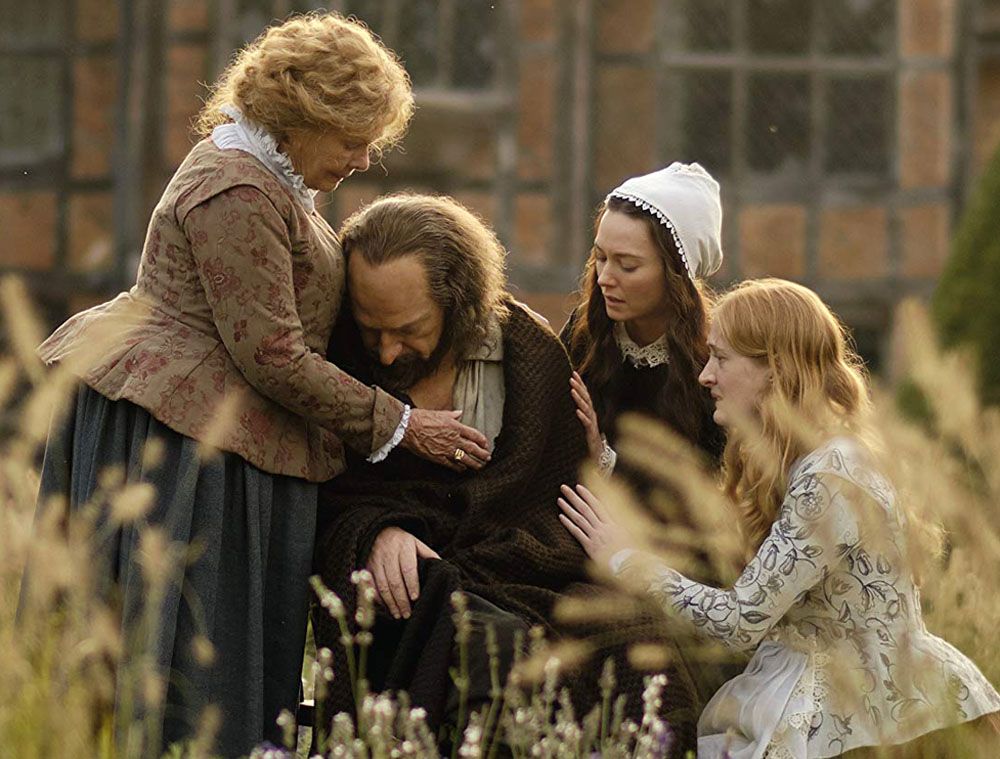It’s a movie about a man who has been away in the big city and returns to a family he’s not used to living with, a man whose works are more beloved than he is. And so here we have Judi Dench (Shakespeare’s Oscar-winning Queen in the aforementioned earlier film, come to think of it), marvelously affecting as somewhat neglected, and poignantly illiterate wife Anne. Kathryn Wilder and Lydia Wilson play two grown daughters — one a spinster and the other in a cold marriage. (But for brief glimmers, that’s the extent of their characters.) The family is haunted by the death, some years earlier, of young son Hamnet (Sam Ellis), seen in ghostly flashback to bookend the film, climatically reciting some choice soothing lines from Midsummer Night’s Dream that are a direct route to misty eyes. The movie is mostly quiet and repetitive, sometimes unconvincing in its circling surface-level conversations. The flat, shallow observation is elevated only by the terrific performances and deepened by Branagh’s occasionally lovely theatrical blocking in uncommonly patient locked-off shots with characters artfully posed and moved in depth and space within the frame. Even so, it’s at its best when springing forth with familiar words from Shakespeare’s quill in a few, key scenes of richly upholstered language and sensitive framing—the boy’s final beyond-the-grave message; a close-up of Nonso Anozie in a cameo performing a speech from Titus Andronicus; a dialogue that melts into mellifluous sonnet recitation between Will and the Earl he admired (Ian McKellen). But that’s the problem with making a new drama out of Shakespeare’s life. No matter one’s good intentions, the writing won’t be as good as his. It stands out brilliantly — a burst of light throwing unflattering attention to the middling quality of every modest line and scene — flat, simple, obvious — around it.
Saturday, June 8, 2019
The Artist as an Old Man: ALL IS TRUE
“Cursed be he that moves my bones,” reads William Shakespeare’s grave site. And yet here we are, once again digging up and extrapolating upon what we know of his life to dramatize for our amusement and edification. The culprit this time is Kenneth Branagh, a fine Shakespearean actor and adaptor when he’s in the mood for it. His All is True — cheeky title, that — loosely adapts what can be surmised of the Bard’s retirement into a slow, stately, shallow portrait of the writer as an old man. Branagh, his face and hair sculpted into a rough approximation of Shakespeare’s portrait, looks appropriately tired. The colorful foliage at the Stratford-upon-Avon estate is in a constant state of rustling and fading. The sunlight always glimmers through the trees and windows with an auburn autumn glow. It’s the opposite end of the spectrum from the classy, boisterous, rumpy-pumpy rom-com Shakespeare in Love, the other relatively recent (alas, has it been over twenty years?) exploration — ahem, wild extrapolation and fictionalization, that is — of Will’s life. Its tone made clear it was a lark, a charmer, a swooning imaginary tribute inspired by the man’s youthful creative vigor. At least that film had great playwright Tom Stoppard pulling out all the witty stops. Branagh has screenwriter Ben Elton on a more wistful, sentimental, downbeat celebratory, soft and aged tack, conjecturing mournful familial strife and assorted matters of business and reputation that we’re meant to scan as perhaps true to life or at least the spirit of it.
Subscribe to:
Post Comments (Atom)


No comments:
Post a Comment